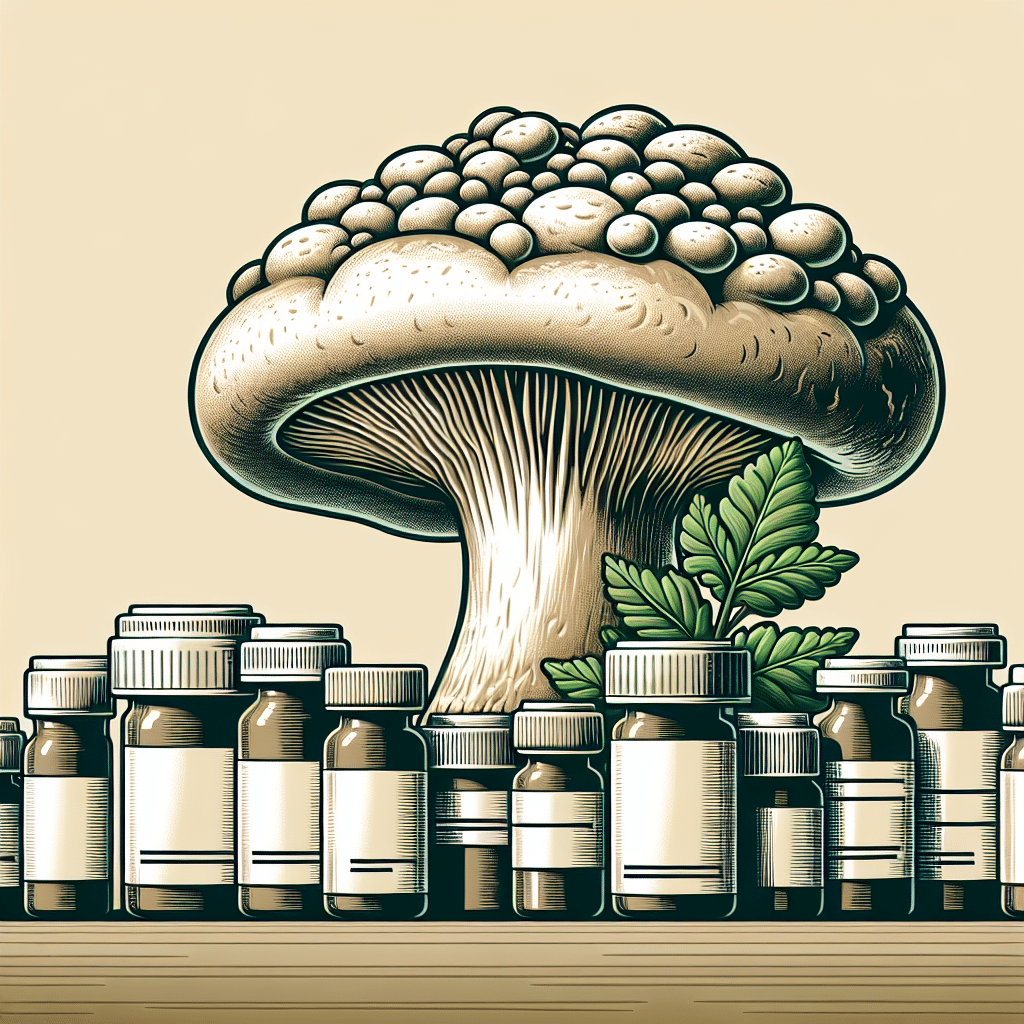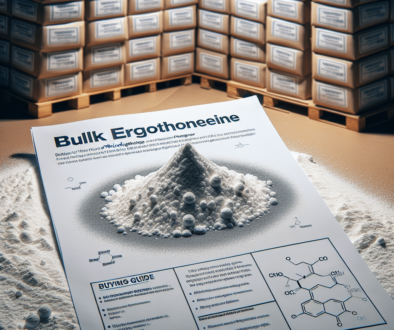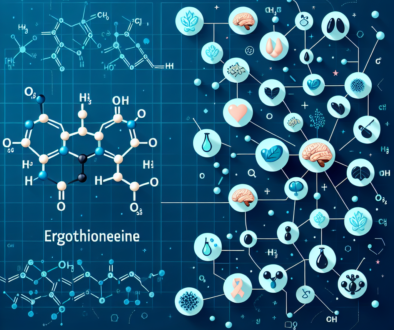Does Maitake Mushroom Interact With Medications?
-
Table of Contents
- Maitake Mushroom and Medication Interactions: What You Need to Know
- Understanding Maitake Mushrooms
- Potential Interactions with Medications
- Case Studies and Clinical Trials
- Consulting with Healthcare Providers
- Conclusion: Balancing Benefits and Risks
- Discover ETprotein’s High-Quality Protein Products
Maitake Mushroom and Medication Interactions: What You Need to Know

Maitake mushrooms, known scientifically as Grifola frondosa, have been a staple in traditional Eastern medicine for centuries. With their growing popularity in Western cultures, these mushrooms are now widely recognized for their potential health benefits, which include boosting the immune system, supporting cardiovascular health, and even exhibiting anti-cancer properties. However, as with any natural supplement, it’s crucial to understand how maitake mushrooms might interact with medications you may be taking. This article delves into the current research surrounding maitake mushroom interactions with drugs, providing valuable insights for consumers and healthcare providers alike.
Understanding Maitake Mushrooms
Maitake mushrooms are a type of adaptogen, which means they help the body resist various stressors, including physical, chemical, and biological factors. They contain beta-glucans, which are known to enhance immune function, and have been studied for their role in regulating blood sugar and cholesterol levels. Despite their health benefits, the potential for interactions with medications cannot be overlooked.
Potential Interactions with Medications
While maitake mushrooms offer numerous health benefits, they may also pose risks when taken in conjunction with certain medications. Here are some of the potential interactions to be aware of:
- Diabetes Medications: Maitake has been shown to have hypoglycemic effects, which means it can lower blood sugar levels. This can be beneficial for those with diabetes, but when combined with diabetes medications, it may cause blood sugar to drop too low, a condition known as hypoglycemia.
- Blood Thinners (Anticoagulants): Maitake contains compounds that could potentially affect blood clotting. When taken with blood thinners like warfarin, there is a risk of bleeding complications.
- Immunosuppressants: Since maitake mushrooms can boost immune function, they may interfere with immunosuppressive drugs used to prevent organ transplant rejection or to treat autoimmune diseases.
- Chemotherapy Drugs: There is some evidence that maitake can enhance the effects of certain chemotherapy drugs, which could be beneficial. However, it could also increase the risk of side effects or alter the intended dose of chemotherapy.
It’s important to note that research on maitake mushroom interactions with medications is still in its early stages, and more studies are needed to fully understand the implications.
Case Studies and Clinical Trials
Several studies have explored the effects of maitake mushrooms on medication efficacy and safety. For example, a study published in the Journal of Cancer Research and Clinical Oncology found that maitake extract could enhance the immune response in breast cancer patients receiving chemotherapy. Another study in the Journal of the American College of Nutrition reported that maitake could lower blood pressure in patients taking antihypertensive drugs, suggesting a potential interaction.
Despite these findings, the sample sizes were often small, and the studies were not always designed to specifically investigate drug interactions. Therefore, while these studies provide some insight, they are not conclusive.
Consulting with Healthcare Providers
Given the potential for interactions, it’s essential for individuals taking medications to consult with their healthcare provider before adding maitake mushrooms to their regimen. This is particularly important for those on medications for diabetes, blood clotting disorders, autoimmune diseases, or cancer. Healthcare providers can offer personalized advice based on an individual’s health history and current medications.
Conclusion: Balancing Benefits and Risks
Maitake mushrooms have a promising role in supporting health and wellness, but they must be used with caution, especially when it comes to medication interactions. While the research is still evolving, being aware of the potential risks and consulting with healthcare professionals can help ensure safe and effective use of maitake mushrooms alongside conventional treatments.
The key takeaways from this article are:
- Maitake mushrooms have health benefits but can interact with certain medications.
- Interactions may occur with diabetes medications, blood thinners, immunosuppressants, and chemotherapy drugs.
- More research is needed to fully understand these interactions.
- Consulting with a healthcare provider before taking maitake mushrooms with other medications is crucial.
Discover ETprotein’s High-Quality Protein Products
If you’re looking for high-quality protein supplements to complement your diet, consider ETprotein’s range of organic bulk vegan proteins and L-(+)-Ergothioneine (EGT). Their products are non-GMO, allergen-free, and come with a neutral taste, making them an excellent choice for various industries, including nutraceuticals, pharmaceuticals, and food and beverage. ETprotein’s commitment to quality ensures that you receive the best protein products to meet your health and wellness goals.
About ETprotein:
ETprotein, a reputable protein and L-(+)-Ergothioneine (EGT) Chinese factory manufacturer and supplier, is renowned for producing, stocking, exporting, and delivering the highest quality organic bulk vegan proteins and L-(+)-Ergothioneine. They include Organic rice protein, clear rice protein, pea protein, clear pea protein, watermelon seed protein, pumpkin seed protein, sunflower seed protein, mung bean protein, peanut protein, and L-(+)-Ergothioneine EGT Pharmaceutical grade, L-(+)-Ergothioneine EGT food grade, L-(+)-Ergothioneine EGT cosmetic grade, L-(+)-Ergothioneine EGT reference grade and L-(+)-Ergothioneine EGT standard. Their offerings, characterized by a neutral taste, non-GMO, allergen-free attributes, with L-(+)-Ergothioneine purity over 98%, 99%, cater to a diverse range of industries. They serve nutraceutical, pharmaceutical, cosmeceutical, veterinary, as well as food and beverage finished product distributors, traders, and manufacturers across Europe, USA, Canada, Australia, Thailand, Japan, Korea, Brazil, and Chile, among others.
ETprotein specialization includes exporting and delivering tailor-made protein powder and finished nutritional supplements. Their extensive product range covers sectors like Food and Beverage, Sports Nutrition, Weight Management, Dietary Supplements, Health and Wellness Products, and Infant Formula, ensuring comprehensive solutions to meet all your protein needs.
As a trusted company by leading global food and beverage brands and Fortune 500 companies, ETprotein reinforces China’s reputation in the global arena. For more information or to sample their products, please contact them and email sales(at)ETprotein.com today.












